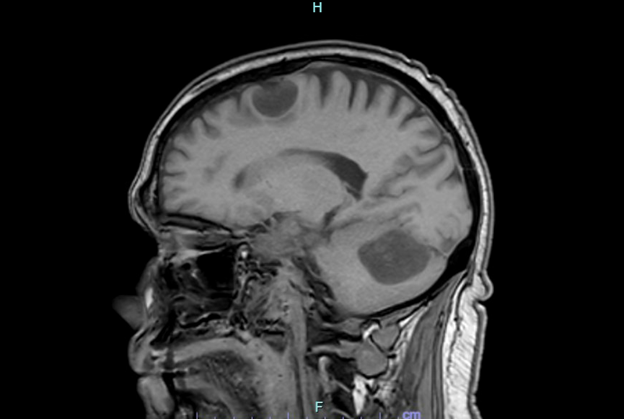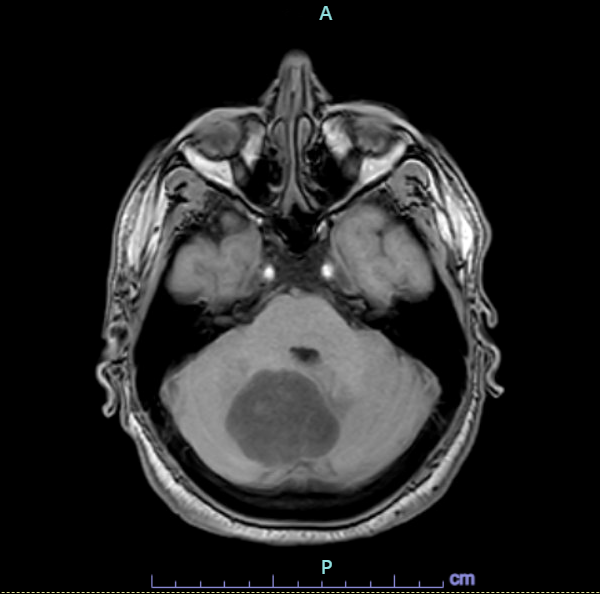Tuesday Poster Session
Category: Colon
P4728 - Uncommon Route: Cerebellar Spread of Colorectal Carcinoma
Tuesday, October 28, 2025
10:30 AM - 4:00 PM PDT
Location: Exhibit Hall

Arvin Razmdideh, DO
University of Texas Health Science Center at Tyler
Tyler, TX
Presenting Author(s)
Arvin Razmdideh, DO1, Swayamdipto Misra, MD1, Bixuan Lin, MD2
1University of Texas Health Science Center at Tyler, Tyler, TX; 2University of Texas Health East Texas Physicians, Tyler, TX
Introduction: Colorectal carcinoma (CRC) is a leading cause of cancer-related death in the United States. While advances in screening and treatment have led to decreased incidence and mortality rates in older adults, the incidence in younger adults has been increasing. Metastatic spread varies by primary tumor location, with the liver, lungs, and peritoneum most affected; bone and brain involvement are rarer but equally important to recognize. This case report presents recurrent colorectal cancer as positional dizziness due to metastasis to the right frontal lobe and cerebellum.
Case Description/
Methods: We present a 59-year-old male with a past medical history of CRC, initially diagnosed in 2022. At the time, he underwent six months of chemotherapy followed by surgical resection. He saw his primary oncologist for follow up once after the procedure. He presented to the emergency department with dizziness, dysarthria, and weakness for two weeks. CT of the head without contrast revealed a 2.2 x 1.6 cm hypoattenuating mass in the right frontal lobe, as well as a 4.3 x 3.4 cm mass within the posterior fossa in the right cerebellum, causing mild mass effect on the fourth ventricle. Neurosurgery was consulted and the patient was placed on a dexamethasone regimen. MRI of the brain was performed for surgical planning, which showed two ring-enhancing lesions in the posterior fossa and right frontal region. He underwent a posterior fossa craniotomy with total excision of the cerebellar tumor. Biopsy of the mass confirmed metastatic adenocarcinoma, histologically compatible with his history of CRC. He was diagnosed with stage IV CRC and, once stable, was discharged with a referral to his primary oncologist for further evaluation and treatment.
Discussion: This case highlights a unique presentation of cerebellar metastasis from colorectal cancer. Most studies report the overall prevalence of brain metastasis in CRC to be between 0.3% and 3.2%. Furthermore, only a small subset of these cases involves cerebellar involvement, with estimates suggesting that roughly 20-30% of CRC brain metastases are infratentorial. Although metastasis to the brain is rare, it is critical to recognize due to potential neurological morbidity.

Figure: Cerebellar mass seen on MRI brain

Figure: Cerebellar and right frontal lobe mass seen on MRI brain
Disclosures:
Arvin Razmdideh indicated no relevant financial relationships.
Swayamdipto Misra indicated no relevant financial relationships.
Bixuan Lin indicated no relevant financial relationships.
Arvin Razmdideh, DO1, Swayamdipto Misra, MD1, Bixuan Lin, MD2. P4728 - Uncommon Route: Cerebellar Spread of Colorectal Carcinoma, ACG 2025 Annual Scientific Meeting Abstracts. Phoenix, AZ: American College of Gastroenterology.
1University of Texas Health Science Center at Tyler, Tyler, TX; 2University of Texas Health East Texas Physicians, Tyler, TX
Introduction: Colorectal carcinoma (CRC) is a leading cause of cancer-related death in the United States. While advances in screening and treatment have led to decreased incidence and mortality rates in older adults, the incidence in younger adults has been increasing. Metastatic spread varies by primary tumor location, with the liver, lungs, and peritoneum most affected; bone and brain involvement are rarer but equally important to recognize. This case report presents recurrent colorectal cancer as positional dizziness due to metastasis to the right frontal lobe and cerebellum.
Case Description/
Methods: We present a 59-year-old male with a past medical history of CRC, initially diagnosed in 2022. At the time, he underwent six months of chemotherapy followed by surgical resection. He saw his primary oncologist for follow up once after the procedure. He presented to the emergency department with dizziness, dysarthria, and weakness for two weeks. CT of the head without contrast revealed a 2.2 x 1.6 cm hypoattenuating mass in the right frontal lobe, as well as a 4.3 x 3.4 cm mass within the posterior fossa in the right cerebellum, causing mild mass effect on the fourth ventricle. Neurosurgery was consulted and the patient was placed on a dexamethasone regimen. MRI of the brain was performed for surgical planning, which showed two ring-enhancing lesions in the posterior fossa and right frontal region. He underwent a posterior fossa craniotomy with total excision of the cerebellar tumor. Biopsy of the mass confirmed metastatic adenocarcinoma, histologically compatible with his history of CRC. He was diagnosed with stage IV CRC and, once stable, was discharged with a referral to his primary oncologist for further evaluation and treatment.
Discussion: This case highlights a unique presentation of cerebellar metastasis from colorectal cancer. Most studies report the overall prevalence of brain metastasis in CRC to be between 0.3% and 3.2%. Furthermore, only a small subset of these cases involves cerebellar involvement, with estimates suggesting that roughly 20-30% of CRC brain metastases are infratentorial. Although metastasis to the brain is rare, it is critical to recognize due to potential neurological morbidity.

Figure: Cerebellar mass seen on MRI brain

Figure: Cerebellar and right frontal lobe mass seen on MRI brain
Disclosures:
Arvin Razmdideh indicated no relevant financial relationships.
Swayamdipto Misra indicated no relevant financial relationships.
Bixuan Lin indicated no relevant financial relationships.
Arvin Razmdideh, DO1, Swayamdipto Misra, MD1, Bixuan Lin, MD2. P4728 - Uncommon Route: Cerebellar Spread of Colorectal Carcinoma, ACG 2025 Annual Scientific Meeting Abstracts. Phoenix, AZ: American College of Gastroenterology.

